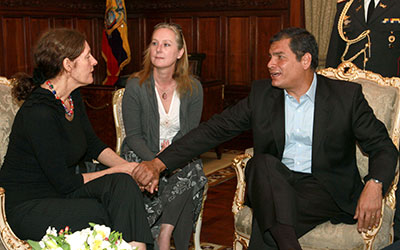The Quito government’s decision to grant Julian Assange political asylum comes at a time when freedom of expression is under siege in Ecuador. President Rafael Correa’s press freedom record is among the very worst in the Americas, and providing asylum to the WikiLeaks founder won’t change the repressive conditions facing Ecuadoran journalists who want to report critically about government policies and practices.
Research by numerous international human rights defenders–including CPJ, Human Rights Watch, the Ecuadoran press group Fundamedios, and the Organization of American States’ special rapporteur for freedom of expression–has concluded that the Correa administration does not brook dissent and is engaged in a campaign to silence its critics in the media.
Take, for example, the recent shutdown of 11 local radio stations. CPJ’s review of the closures found that a majority of the stations had been critical of the government and that regulators did not follow due process in many instances. In a letter to Director of Telecommunications Fabián Jaramillo, we expressed concern that the closures were a politicized effort to control the flow of information.
A 2011 CPJ special report found that Correa and his administration had a record of filing defamation lawsuits in civil and criminal courts as a means of intimidating critics. A case against the leading newspaper El Universo was emblematic of the practice. In February, Correa won a libel suit against the paper. Three directors and former opinion editor Emilio Palacio were sentenced to three years each in prison and a total of US$40 million in damages. Correa’s complaint stemmed from a February 2011 opinion column that suggested the president could be charged with crimes against humanity for his actions during a violent police uprising in 2010. Correa later pardoned the journalists–after having accomplished his goal of intimidating anyone who might challenge his policies. (It was too late for Palacio, who fled the country for fear of imprisonment.)
Legislation has also been passed to target critics in the media. Changes to the electoral law, passed by the National Assembly in January, included broadly worded provisions that will hamper press coverage of political campaigns ahead of the February 2013 presidential vote, when Correa will seek re-election. One provision states that the media “must abstain from promoting directly or indirectly” the campaigns of political candidates during the 90 days leading up to an election. Another prohibits media from publishing or transmitting any type of information, photos, or opinions about the electoral process during the 48 hours leading up to the election. A communications bill now under consideration in the National Assembly could further restrict free expression; its ambiguous language would give regulators wide discretion to impose arbitrary sanctions and censor the press.
Following in the footsteps of Venezuelan counterpart Hugo Chávez, Correa has also built a muscular state media network that is used to launch smear campaigns against critics and to advance his narrow political agenda, CPJ research shows.
It is ironic that the same government that has granted asylum to Assange has driven El Universo‘s Palacio into exile in the United States and is now using state media to smear César Ricaurte, head of Fundamedios and a leading defender of free expression.
The international community is not fooled. During the U.N. Universal Periodic Review in May, 17 member states drafted numerous recommendations to bolster the sad state of free expression in Ecuador. The government responded as it does to any reproach: with disdain. Foreign Affairs Minister Ricardo Patiño said “ignorance” was behind the international criticism.
But as Ecuador provides support to Assange–an assertive if controversial force in promoting the free flow of information–it would do well to start listening to its critics, domestic, and international, and unstop the flow of information right at home.
